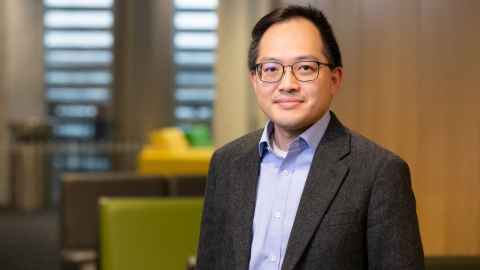Yat Ming Ooi on the importance of Industry 4.0 technologies to build a safer future
Dr Yat Ming Ooi is researching innovation strategy and the role of emerging technologies in shaping innovation processes in established firms.

Early days
“I grew up in Malaysia and travelled to the UK to do my undergraduate degree. After I graduated, I went back to Malaysia and worked in Human Resources. Not satisfied with working in HR, I moved to Australia to do a Master of Commerce specialising in Business Strategy. After completing that, I was recruited for another HR job – this time in Singapore – but it only further confirmed for me that HR was not my thing.
“So, I decided to do a PhD. While I was searching for supervisors in innovation, management and strategy I found Kenneth Husted and that’s what brought me here to Auckland. In 2022, I began my role as a lecturer in the Business School.
I still remember after finishing my undergraduate degree, my friends and I said that we were so tired of studying and not going to do anymore – but my curiosity got the better of me.
“I really liked history a lot when I was younger. I was reading my parents' history textbooks for fun as my pastime. And I also really like science. I read a lot of science but didn't study it.
“I still remember after finishing my undergraduate degree, my friends and I said that we were so tired of studying and not going to do anymore – but my curiosity got the better of me.
“For my masters, I wanted to try to deepen my knowledge around business strategy. And for my PhD, I was curious about doing research and I’ve ended up really enjoying that process.
Circular economy research
“I remember when I first came to Auckland and discovered Trade Me. I would buy something from there and sell it when I didn’t need it anymore. I liked the idea that if I didn’t need it, someone else could use it. That's partly what attracted me to research in the circular economy area.
“I was involved with launching the Circular Economy for Business research beacon. I'm also doing some business development but from an academic sense. I'm in conversation with people from the NSW government in Australia who are looking at the circular economy, how it can be stimulated through public procurement and what role the beacon can play.
“I'm concerned with how we connect all this to the social side of things. Rather than it just being about the material we use and not introducing new materials to the landfill but more towards the social implications, which is not mentioned a lot in circular economy.
Construction and innovation
“I grew up with my Mum telling me that prevention is better than cure. That we should try and prevent things from happening if we can, rather than try to fix them when we see the cracks. That’s what we’re aiming to do with the construction research project I’m involved with.
“The project is industry-led by the Heavy Engineering Research Association (HERA), multi-institutional and multidisciplinary, with researchers from the Faculties of Science and Engineering. We’re looking at the construction industry in New Zealand and seeing how we could introduce Industry 4.0 technologies to create safer structures.
“It’s important research in New Zealand because we are prone to earthquakes among other things. When you build a specific building or structure, you need to consider the different environmental factors and it's critical to have new standards for buildings that address these.
Introducing these Industry 4.0, or as we call it Construction 4.0 technologies, could help build safer buildings and structures for the future.
“Our science and engineering colleagues are developing all these technologies, but how do we then transfer them to the sector. How do we ensure that the construction companies understand and are able to use the new technologies?
“Our aim is to come up with a framework to show what some of the barriers and drivers are to transferring these technologies. The project has a strong mātauranga Māori lens, and this is helping us understand how we could incorporate that view into what we are doing as well.
“For me it's exciting because I think no one would look at the construction industry and think that digital transformation is something relevant to them. It is traditionally a very labour-intensive sector. When we talk about Industry 4.0 technologies, we always look at smart manufacturing or the Internet of Things, but rarely do we look at construction.
“When I'm doing research, I think I have a more applied and pragmatic approach compared to maybe some of my colleagues who might be a bit more philosophical or theoretical in their thinking. I think that helps because when you talk to companies you have that mindset of standing in their shoes.